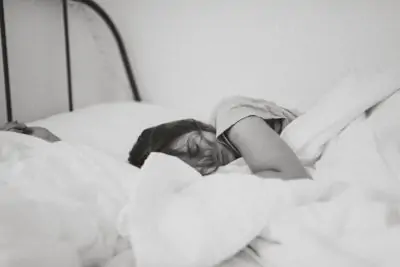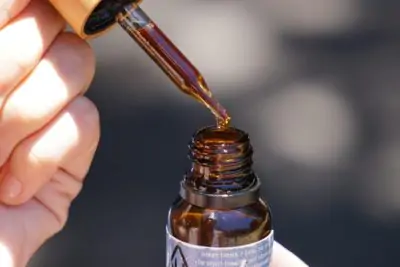How do CBD and THC Affect Sleep?
Do CBD and THC affect sleep?
Do you use cannabis – either pure CBD or a mix of CBD with THC – to help you sleep “better?”
This is one of the most common questions you guys ask me on social media, so we’re finally going to tackle it:
Do CBD and THC affect sleep? And could they actually be beneficial?
Let’s get into it.
Cannabinoids affect your sensory awareness
The first thing to understand about cannabinoids (the compounds found in cannabis, two of which are CBD and THC) are substances that alter our sensory awareness.
And if you remember from my blog about nighttime routines, doing things to lower your sensory input near bed is crucial to drift into quality sleep.
This is because our sympathetic nervous system needs to think it’s safe enough for you to rest for a while.
You can’t be anxiously awaiting a tiger that’s about to attack and fall asleep.
So, in this sense, cannabinoids – specifically CBD – has the potential to be helpful for sleep.
CBD has been shown to decrease sensory awareness, and I don’t necessarily mean that in a bad way.
There are plenty of studies on CBD and its effects on physical pain, especially in acute conditions such as fibromyalgia or other nerve-related conditions.
The long story short is that CBD in particular has been shown to generally decrease feelings of pain or discomfort in the body.
The neurological reasoning behind this is still being studied.
But if CBD is helping patients with fairly uncomfortable conditions fall asleep easier, it is likely that it can bring similar calming effects to anyone.
And when related to my advice for good sleep hygiene, we want to make ourselves as comfortable as possible in order to sleep our best.
If that means minor aches and pains are alleviated with the help of CBD, I can only see that as beneficial.

Cannabinoids are synergistic with the sleep cycle
So, now that we know that CBD can help with decreased sensory input, let’s touch on whether it helps sleep on a molecular level.
The short answer is no.
Funny enough, the receptors for cannabinoids in our bodies were discovered before cannabinoids themselves were.
For all the various political reasons, cannabis hasn’t been studied much until recently.
But as scientists uncovered more about the messaging systems and various receptors in the body, they just kind of figured they would learn the use for cannabinoid receptors sooner or later.
When cannabis research finally became allowed, we realized, “oh, that’s what those were for!”
That being said, the receptors for cannabinoids are a totally different piece of the biological puzzle than the factors involved in the sleep cycle.
When we discuss the “ingredients” needed for the body to naturally sleep well on its own, cannabinoids are not on that list.
As a reminder: to build melatonin in the body, we need 3 things:
- Magnesium
- Vitamin D3
- Tryptophan
These are combined using various processes in the body to make serotonin, and then some of that serotonin converts to melatonin.
Melatonin then initiates sleep when your environment allows your body to relax enough to actually fall asleep.
So on a molecular level, no. You’re not sleeping better from CBD because you had a missing ingredient in the factors needed to induce or keep you asleep.
However, I do think cannabinoids are synergistic because of the sensory decreases I’ve already mentioned above.
They help you relax more, which can cue your brain and body to allow you to fall asleep easier and faster.

CBD and THC affect sleep – but not how you may think
Now, when we get into the effects of CBD combined with THC for sleep…things change a little bit.
Because while THC is a cannabinoid, it’s got some different effects than the CBD / CBN / etc spectrum.
THC is the psychoactive cannabinoid that, for a lack of a better term, is the part of cannabis that “gets you high.”
And it’s interesting when we add THC to the cannabinoids for sleep conversation because most people will report better sleep if they consume both CBD and THC together before sleeping.
We tend to perceive improved sleep when using both before bed.
However, a brain scan of sleep activity will tell a different story.
When there is active THC in our system during sleep, we actually skip a few sleep stages.
If you’ve ever talked to someone who uses THC to “help” with sleep for a while and then takes a break, a common thread is that they get their dreams back.
This seems like a good enough indicator to me that certain stages of sleep (like REM) are skipped for whatever reason when THC is active in your system.
So while you might feel like you’re sleeping better in the short term, it’s likely not helping in the long run.
It’s also important to reiterate that this is from THC only – not CBD.
CBD does not seem to have any adverse effects that we’ve observed yet, and can possibly help with the relaxation needed before sleep to help you initiate it easier.

Dosing tolerance of CBD vs. THC
One other piece of information about CBD and THC that I find useful is understanding dosages.
These two cannabinoids behave very differently when it comes to how much a person can/should take in order to “feel the effects.”
To start with THC, tolerance forms very quickly.
This means that if you were to consume it daily over a period of 30 days, you would need significantly more of it each day in order to “achieve the same high.”
CBD, on the other hand, doesn’t really build a tolerance in the body at all.
There might be a slight difference from day 1 to day 30, but in general people have an effective dosage level that stays around that amount.
You can take more CBD, but you won’t really notice more returns on it.
Furthermore, the felt effects of CBD can vary a ton from person to person.
I’ve heard of some people needing up to 3,000mg at once before they notice anything, while others need as little as 30mg.
So, with CBD in particular, you’ll probably need to test it out for yourself to find that threshold.
But once you find your minimum effective dose, you don’t need to go over that because you won’t continue to see huge returns beyond that.
Should you take CBD or THC before bed?
So, let’s wrap it up.
Should you take CBD or THC before bed?
My answer is that CBD likely is complimentary to helping with the sleep process, though it’s not directly involved on the molecular level.
When it comes to THC, it’s best to skip it before bed.
While it’s much better to consume before sleep than alcohol or sleep aids, it’s still causing you to skip a crucial piece of your sleep stages (the REM stage) and that’s not going to have good long-term effects.
I hope this blog helped clear up some of that confusion!
If you’re looking for a non-addictive way to naturally improve your sleep, check out my Sleep Remedy supplement.
You can find out more about it right here:

